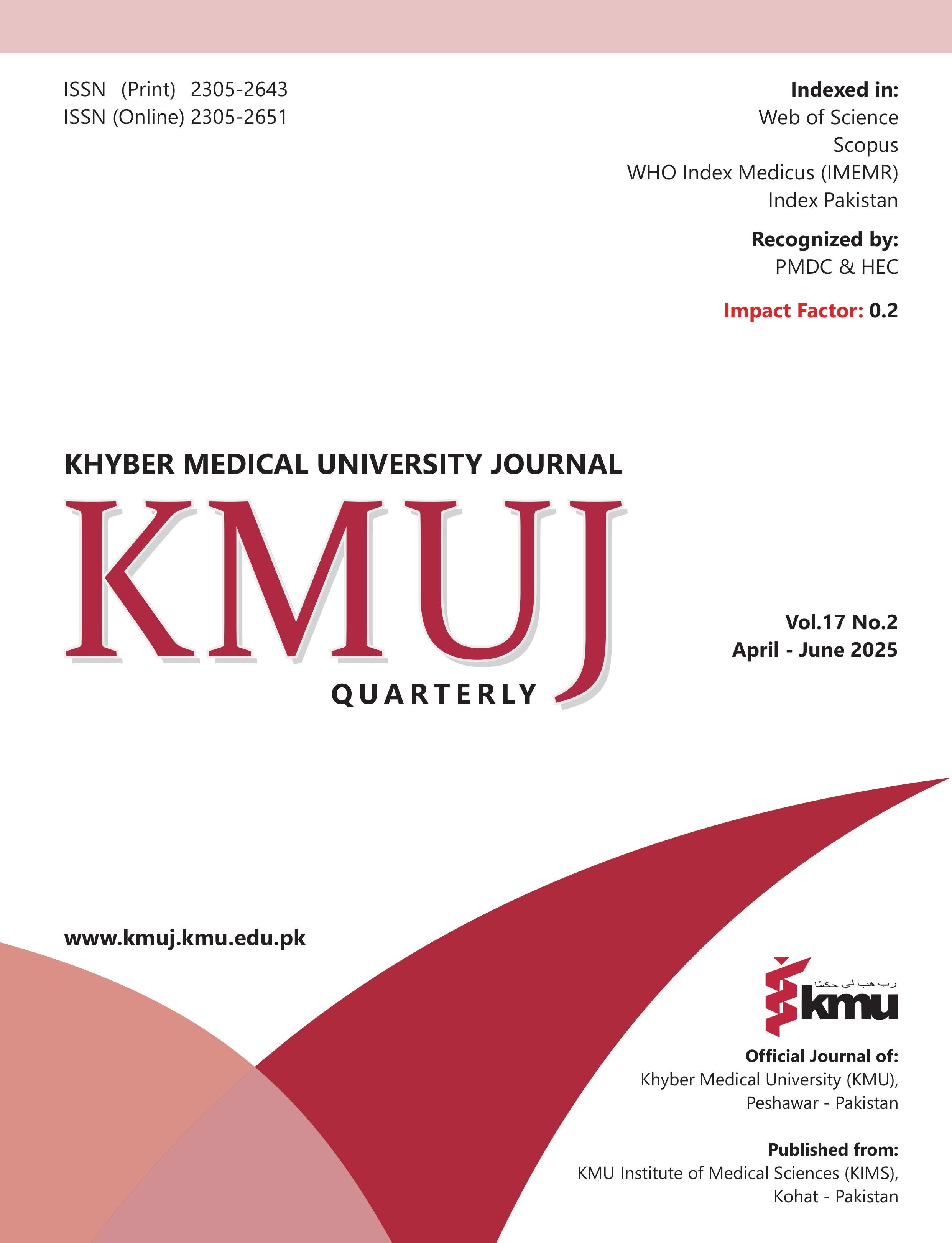Effect of immunomodulatory drugs on Expanded Disability Status Score in multiple sclerosis – a prospective study
Main Article Content
Abstract
Objective: To evaluate the effectiveness of different immunomodulatory treatments in slowing disability progression in patients with multiple sclerosis (MS), using the Expanded Disability Status Scale (EDSS) over one year.
Methods: This prospective observational before-and-after study was conducted at the Neurology Department, Dr. Ruth K. M. Pfau Civil Hospital Karachi, from July 2022 to December 2023. Newly diagnosed, drug-naive MS patients aged 14-50 years, meeting McDonald criteria, were enrolled and followed for 12 months. EDSS scores were recorded at baseline, 6 months, and 12 months post-treatment initiation. A Pearson correlation analysis was conducted to assess the association between different immunotherapies and EDSS scores at 12 months. Additionally, one-way ANOVA was used to compare EDSS scores across various immunotherapy groups, with post-hoc analyses performed to identify significant pairwise differences.
Results: Fifty-six patients (majority aged 20–40 years, predominantly female) completed the study. Immunotherapy significantly reduced mean EDSS scores from baseline (5.49) to 12 months (4.67) (mean difference=0.82; p<0.001). However, there was no significant correlation between specific immunotherapies administered and EDSS scores after one year (r=-0.022, p=0.876). ANOVA revealed no significant differences in EDSS scores among different immunomodulatory agents (F (4,50) =0.204, p=0.935).
Conclusion: Immunomodulatory treatments significantly improved disability outcomes in MS patients over one year. However, no specific agent demonstrated superior efficacy, emphasizing the importance of personalized treatment strategies in managing multiple sclerosis.
Article Details

This work is licensed under a Creative Commons Attribution 4.0 International License.
Work published in KMUJ is licensed under a
Creative Commons Attribution 4.0 License
Authors are permitted and encouraged to post their work online (e.g., in institutional repositories or on their website) prior to and during the submission process, as it can lead to productive exchanges, as well as earlier and greater citation of published work.
(e.g., in institutional repositories or on their website) prior to and during the submission process, as it can lead to productive exchanges, as well as earlier and greater citation of published work.
References
1. Thompson AJ, Banwell BL, Barkhof F, Carroll WM, Coetzee T, Comi G, et al. Diagnosis of multiple sclerosis: 2017 revisions of the McDonald criteria. Lancet Neurol 2018;17(2):162-73. https://doi.org/10.1016/S1474-4422(17)30470-2
2. Browne P, Chandraratna D, Angood C, Tremlett H, Baker C, Taylor BV, et al. Atlas of multiple sclerosis 2013: a growing global problem with widespread inequity. Neurology 2014;83(11):1022-4. https://doi.org/10.1212/WNL.0000000000000768
3. Kurtzke JF. Rating neurologic impairment in multiple sclerosis: an expanded disability status scale (EDSS). Neurology 1983;33(11):1444-52. https://doi.org/10.1212/wnl.33.11.1444
4. Lublin FD, Reingold SC, Cohen JA, Cutter GR, Sørensen PS, Thompson AJ, et al. Defining the clinical course of multiple sclerosis. Neurology 2014;83:278-86. https://doi.org/10.1212/WNL.0000000000000560
5. Baecher-Allan C, Kaskow BJ, Weiner HL. Multiple sclerosis: mechanisms and immunotherapy. Neuron 2018;97(4):742-68. https://doi.org/10.1016/j.neuron.2018.01.021
6. Tejera-Alhambra M, Fernández-Paredes L, de Andrés C, Sánchez-Ramón S. Multiple sclerosis: where do we go from here. EMJ Neurol 2016;4(1):84-95. https://doi.org/10.33590/emjneurol/10313951
7. Rae-Grant A, Day GS, Marrie RA, Rabinstein A, Cree BAC, Gronseth GS, et al. Comprehensive systematic review summary: disease-modifying therapies for adults with multiple sclerosis: report of the guideline development, dissemination, and implementation subcommittee of the American Academy of Neurology. Neurology 2018;90(17):789-800. https://doi.org/10.1212/WNL.0000000000005345
8. Gonzalez-Lorenzo M, Ridley B, Minozzi S, Del Giovane C, Peryer G, Piggott T, et al. Immunomodulators and immunosuppressants for relapsing-remitting multiple sclerosis: a network meta-analysis. Cochrane Database Syst Rev 2024;1(1):Cd011381. https://doi.org/10.1002/14651858.CD011381.pub3
9. Giovannoni G, Butzkueven H, Dhib-Jalbut S, Hobart J, Kobelt G, Pepper G, et al. Brain health: time matters in multiple sclerosis. Mult Scler Relat Disord 2016;9(Suppl 1):S5-S48. https://doi.org/10.1016/j.msard.2016.07.003
10. Comi G, Filippi M, Barkhof F, Durelli L, Edan G, Fernández O, et al. Effect of early interferon treatment on conversion to definite multiple sclerosis: a randomised study. Lancet 2001;357(9268):1576-82. https://doi.org/10.1016/s0140-6736(00)04725-5
11. Bergvall N, Makin C, Lahoz R, Agashivala N, Pradhan A, Capkun G, et al. Relapse rates in patients with multiple sclerosis switching from interferon to fingolimod or glatiramer acetate: a US claims database study. PLoS One 2014;9(2):e88472. https://doi.org/10.1371/journal.pone.0088472
12. Johnson KP, Brooks BR, Cohen JA, Ford CC, Goldstein J, Lisak RP, et al. Copolymer 1 reduces relapse rate and improves disability in relapsing-remitting multiple sclerosis: results of a phase III multicenter, double-blind placebo-controlled trial. The Copolymer 1 Multiple Sclerosis Study Group. Neurology 1995;45(7):1268-76. https://doi.org/10.1212/wnl.45.7.1268
13. Polman CH, O'Connor PW, Havrdova E, Hutchinson M, Kappos L, Miller DH, et al. A randomized, placebo-controlled trial of natalizumab for relapsing multiple sclerosis. N Engl J Med 2006;354(9):899-910. https://doi.org/10.1056/NEJMoa044397
14. Hauser SL, Bar-Or A, Comi G, Giovannoni G, Hartung HP, Hemmer B, et al. Ocrelizumab versus Interferon Beta-1a in relapsing multiple sclerosis. N Engl J Med 2017;376(3):221-34. https://doi.org/10.1056/NEJMoa1601277
15. Montalban X, Hauser SL, Kappos L, Arnold DL, Bar-Or A, Comi G, et al. Ocrelizumab versus placebo in primary progressive multiple sclerosis. N Engl J Med 2017;376(3):209-20. https://doi.org/10.1056/NEJMoa1606468
16. Hartung HP, Gonsette R, Konig N, Kwiecinski H, Guseo A, Morrissey SP, et al. Mitoxantrone in progressive multiple sclerosis: a placebo-controlled, double-blind, randomised, multicentre trial. Lancet 2002;360(9350):2018-25. https://doi.org/10.1016/S0140-6736(02)12023-X
17. Casetta I, Iuliano G, Filippini G. Azathioprine for multiple sclerosis. Cochrane Database Syst Rev 2007;2007(4):Cd003982. https://doi.org/10.1002/14651858.CD003982.pub2
18. Frohman EM, Brannon K, Racke MK, Hawker K. Mycophenolate mofetil in multiple sclerosis. Clin Neuropharmacol 2004;27(2):80-3. https://doi.org/10.1097/00002826-200403000-00006
19. Weiner HL, Mackin GA, Orav EJ, Hafler DA, Dawson DM, LaPierre Y, et al. Intermittent cyclophosphamide pulse therapy in progressive multiple sclerosis: final report of the Northeast Cooperative Multiple Sclerosis Treatment Group. Neurology 1993;43(5):910-8. https://doi.org/10.1212/wnl.43.5.910
20. Jawaid W. Multiple sclerosis and Parkinson’s disease: poles apart or cut from the same cloth? Pak J Neurol Sci 2022;17(04):03-04. https://doi.org/10.56310/pjns.v17i04.223
